Dental Implant: Definition, Benefits, Types of implant
The Effects of Missing Teeth
- Appearance: The effects of missing teeth can be detrimental to your long term oral and medical health. Missing teeth are also recognized associated with old age and can make you look older than you are. Replacing missing teeth can dramatically improve your smile and the shape of your face. This greatly enhances both your dental health and self-esteem.
- Confidence: Missing teeth can have a significant impact on a person’s self- confidence. People with missing teeth often express a feeling of loss: That they have lost their young fullness, or their sex appeal or their ability to speak in public or to be active. It is only after their teeth are lost that many people realize that the healthy month is necessary for maintaining a good quality of life.
- Health: Teeth provide more functions than just the ability to chew. They are necessary for the health of gum, jaw, and other teeth.
- An Off-bite Relationship: Having gaps where teeth are missing affects the way the jaw closes. The remaining teeth begin to tilt and drift into the gaps. In addition, food can become trapped in these spaces, increasing the risk of decay and gum disease. The tilting and drifting can also cause problems for the opposing teeth. An opposing tooth will begin to hyper erupt and begin to drift into the open space of the missing tooth, causing the opposing jaw-line to have bite relationship problems; thus beginning TMJ problems (problems with the jaw joint).
- Jawbone Deterioration: As soon as a tooth is lost, either from gum disease or an extraction, the supporting bone in the jaw begins to dissolve. This process is called resorption. The longer a tooth is missing, the greater the bone loss. Over time, resorption of the jawbone has a considerable effect on the quality of life and on the possibility of replacing the missing teeth.
- Nutrition: As teeth are lost it becomes more difficult to eat and chew food. Studies have shown that 29 % of denture wearers eat only soft or mashed foods and 50% avoid many foods altogether. And over time, more and more of the jaw bone disintegrates until it becomes very difficult to place any dental restoration.
What Are Dental Implants?
Replicating the natural function and appearance of your lost teeth can be very difficult to accomplish. Historically, dentures or bridge restorations would be used as replacements, but with limited results.
Dental implants, however, are natural-looking replacements for missing teeth that also provide the same function as your natural tooth root. They have also been used to anchor these other types of restorations for greater success and patient satisfaction.
A More Natural Approach
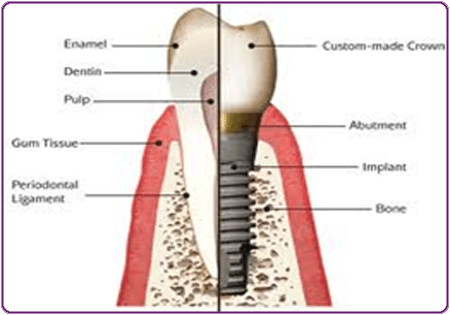
A dental implant is a small, sturdy, titanium post that acts as the root structure would for a natural tooth. A dental implant is placed into your upper or lower jaw bone. After the bone has grown around the implant, implants can hold a crown, bridge, or over-denture just like roots hold natural teeth in place. Implants are very durable and can last a lifetime.
They require the same maintenance as natural teeth; this includes brushing, flossing, and regular dental check-ups. A single tooth or a full arch of teeth that have been lost due to injury or disease can be replaced with dental implants. Titanium metal is used because of its compatibility with bone and oral tissues.
The Benefits of Dental Implants
More healthful and beautiful
When teeth are missing, the surrounding bone begins to shrink. This unhealthy bone loss can make your jawline recede. Implant dentistry can help prevent deterioration of the jawbone caused by loss of teeth, so your face retains its natural shape.
More Comfortable
Because dental implants are securely anchored, there is no slipping or movement as there is with dentures. This eliminates some of the key worries of dentures, including poor fit, gum irritation, and pain from exposed nerves.
More Confident
With dental implants, you’ll never need to cover your mouth when laughing, smiling, or speaking. You can eat your favorite foods without pain or fear of embarrassment. You will look better, feel better, and live more confidently
Why Should I Get Dental Implants?
Dentures

Many people with missing teeth wear conventional upper and lower dentures or partial dentures and many are unhappy with them. Lower dentures never fit or feel like natural teeth.
They become loose fitting due to shrinking gum tissue, which then causes irritation to the mouth, sores, and pain. Lower dentures also restrict your ability to eat or talk as you had with your natural teeth. The only relief is in using messy dental adhesive to improve the fit.
Upper dentures are a bit different. They are easier to wear because the suction in the upper palate (roof of the mouth) helps keep the denture in place.
But having the palate covered can also reduce the taste of foods that you are eating. Sores and pain in chewing and talking are quite frequent as the gum tissue shrinks, and many people suffer from having to use dental adhesive with upper dentures as well.
Removable partial dentures might be used when only several teeth are missing. A partial denture anchors to the teeth on either side of the empty area using a metal clasp. This can be very damaging to these teeth. Removable partial dentures can also be hard on the gum tissue when chewing and talking.
The advantage of upper and lower dentures is that they can be constructed quickly and they initially cost less than implants. They may last a lifetime, but over the years with aging, new sets need to be made to fit the changing gum tissue and chewing surfaces of the teeth in the dentures.
Get to know about many types of dentures in this article.
Dental Bridge
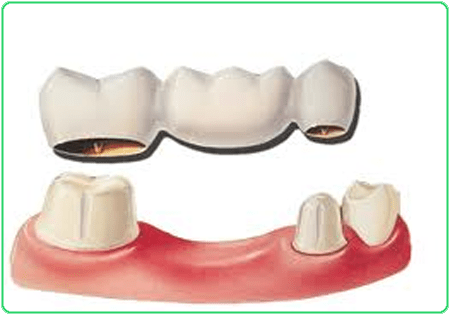
It is common for your teeth to be mildly sensitive to extreme temperatures for a few weeks after the treatment. The buildup of bacteria formed from food acids on your teeth and gums can become infected if proper oral hygiene is not followed. We have to sacrifice some adjacent teeth of empty place for bridge‘s supporters by grinding a necessary amount of enamel on some natural teeth, therefore, natural teeth cannot save its shape & heath.
Dental Implants – A Better Solution
Every way you look at it, dental implants are a better solution to the problem of missing teeth.
- Esthetic Dental implants look and feel like your own teeth! Since dental implants integrate into the structure of your bone, they prevent the bone loss and gum recession that often accompany bridgework and dentures. No one will ever know that you have a replacement tooth.
- Tooth-saving Dental implants don’t sacrifice the quality of your adjacent teeth like a bridge does because neighboring teeth are not altered to support the implant. More of your own teeth are left untouched, a significant long-term benefit to your oral health!
- Confidence Dental implants will allow you to once again speak and eat with comfort and confidence! They are secure and offer freedom from the irksome clicks and wobbles of dentures. They’ll allow you to say goodbye to worries about misplaced dentures and messy pastes and glues.
- Reliable Dental implants have a high success rate. They are considered an excellent option for tooth replacement.
How long do dental implants last?
Two of the major questions that people ask when it comes to dental implants are, “What is the long-term success rate?” and “How long will they last?”
The simple answer to the long-term success rate of dental implants is that dental implants can fail, but fortunately very infrequently. Failure rates vary depending on the site in the mouth, whether they are placed into the natural or grafted bone and whether the patient smokes.
The overall success rate in natural bone is 95%, though this falls to between 85 and 90% in grafted bone.
If a patient smokes it has been shown that they are statistically two and a half times more likely to have an implant fail than a non-smoker.
As to the longevity of dental implants, honestly, at the present time, we cannot answer this question. At the moment we can only say that the first patient who had dental implants placed in 1965 still has his original implants in function today.
With that being said, undoubtedly, the best steps to take avoid encountering ailing or failing dental implants are to maintain meticulous oral hygiene and evaluate the dental implant
How do I get dental implants?

Step 1:
Doctors of The East Rose Dental (Old Rose Dental Clinic) do a thorough oral examination and address the situation that your general dentist has referred you for. This may include but may not be limited to:
- Review your dental and medical history
- Dental exam
- Bite evaluation
- Height and width of your jawbones are measured
- Anatomic structure are identified ( nerves position and sinus proximity)
- Dental X- Rays
- 3-dimensional bone scans
If the doctors feel you are good candidates for dental implants, the treatment plan will be prepared for you and anesthesia options discussed. An appointment to begin treatment can then be made.
Step 2:
Doctors may have to prepare the areas where your tooth is missing prior to place the implant. This could be including removal of excess gum tissue or bone, reshaping or rebuilding the bone.
Step 3:
Doctors will place the implant in your jaw and allow it to anchor and heal to the jaw bone. This process usually takes about 3 – 6 months. A temporary tooth can be placed in your mouth while the implant heals.
Step 4:
One the implant had anchored to your jaw bone, the permanent false tooth can be placed over the implant by your dentist. In denture case, your general dentist will attach the denture to the implants.
Will the body reject a dental implant?

The body does not reject the material used for dental implants. There could be problems such as:
- If the bone quality is poor.
- The bone is overheated while preparing the site for the implant.
- The implant is under excess function.
- Infection present in the bone next to the implant.
- Poor oral hygiene as an implant is more suspectable to gum disease than a natural tooth.
An implant could fail after it is placed if the patient’s home care is not ideal and yes if the implant is placed with forces hitting it in an obtuse angle it could fail, implants like forces to be placed in the center of the implant.
How long does it take?
The answer to this question depends upon the type of dental implant treatment provided. The complete implant reconstruction process may take from 1 to 9 months and in some cases longer. Time is needed for your jawbone to grow around the implant and for your replacement teeth to be made.
Procedures vary, but it usually includes two surgical steps and then the restoration is fabricated. First, your dentist or a specialist places the dental implants into your jawbone. Bone cells grow around the implants that may take up to six months to occur.
Your dentist or the specialist then makes a small incision in the gum tissue and connects a healing post to your implant(s). The gum tissue heals around the post for a period of 3-6 weeks or longer.
Your dentist then attaches a post and makes the replacement teeth. It may take several visits and several months to complete the restoration process.
How painful are dental implants?
Most people who have received dental implants say that there is very little discomfort involved in the procedure. Local anesthesia can be used during the procedure, and most patients report that implants involve less pain than a tooth extraction.
After the dental implant, mild soreness can be treated with over-the-counter pain medications, such as Tylenol® or Motrin®. A soft diet is recommended, and in some cases, required during healing.
How Do I Care For My Implant?
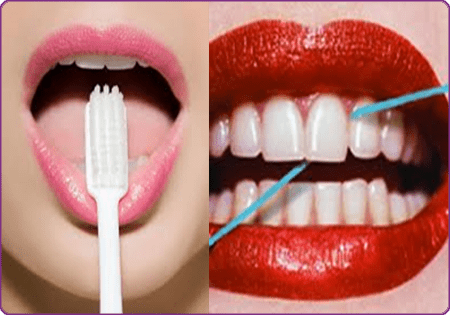
Dental implants require the same care as real teeth, including brushing, flossing, and regular dental check-ups.
Good oral hygiene is necessary to maintain oral health. This is especially true in the presence of dental implants. Because a dental implant is constructed from titanium or other biocompatible material, they do not form cavities. However, they are on the other hand prone to bone loss.
Inflammation of supporting tissue with the presence of bone loss around teeth is referred to as periodontitis. Inflammation of supporting tissue with bone loss is referred to as periimplantitis. Peri -implants are often seen in patients with poor oral hygiene.
Even though the importance of oral hygiene may not be stresses by the surgeon, in most cases after Osseointegration, or fusion of the implant to the bone, keeping the dental implant clean and healthy is the number one determinant of long term implant success.
Obtaining a dental implant is a short and simple process but maintaining it can pose more of a challenge. This is especially true for patients who have not practiced good home care throughout their life. A dental implant has to be looked at as an investment, which provides good oral and general health as well as a pleasing appearance. Let’s go into more detail about oral hygiene and dental implants.
Dental implants and implant restorations are cared for in the same manner as our natural teeth. The main goal of the oral hygiene technique is plaque removal.
Brushing away the plaque from the surface of the crown or implant especially focusing on the area around the gum line is critical. Eliminating the plaque, which occurs between the teeth, is accomplished by flossing.
It is also important to regularly check the implant assembly for any movement. Any loosening of components should be treated as emergencies. The motto for dental implant patient’s home care is “floss, brush, and wiggle.”
Regular toothbrushes and toothpaste are recommended. Electrical toothbrushes can be beneficial because they are more efficient in plaque removal.
Regular floss is adequate for most implant-crown assemblies. In situations where large spaces exist between dental implants or a dental implant and a natural tooth, yarn, post-implant care kit (Butler GUM), and superfloss (Oral B) are recommended in place of floss. These products are very efficient at plaque removal and are easy to use. They should also be used in situations when dental implants are splinted together with a dental bridge or another prosthesis.
In instances where a proxy brush or any other type of interdental brushes is used care must be taken to ensure that the wire that holds the bristles is nylon coated. This will protect the titanium surface of the implant from being scratched by the wire. Scratching the implant surface will create microscopic grooves that will harbor bacteria and cause localized inflammation.
Oral hygiene around dental implants and implant restorations is just as important as oral hygiene around natural teeth. Good oral hygiene will lead to the long-term stability of the dental implant and natural teeth, and provide years of oral health.

How Many Minimal Numbers of Implants Do I Need?
1 Implant + 1 Crown if you lost 1 tooth

2 Implants + 3 unit Crowns if you lost 3 teeth
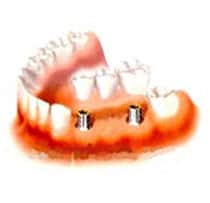
3 Implants + 3 unit Crowns if you lost 3 teeth
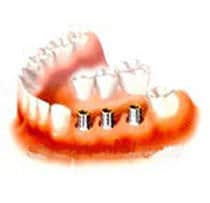
2 Implants + 4 unit Bridges if you lost 4 teeth
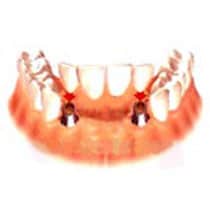
6 Implants + 12 unit Bridges if you lost all teeth on 1 arch
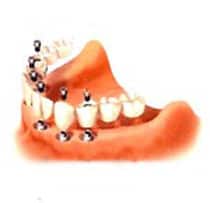
All-on-4 + A fixed high impacted acrylic bridge If you lost all teeth on 1 arch
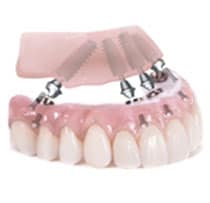
All on 6 + a fixed full-arch bridge if you lost all teeth on 1 arch.

All on 8 + a fixed full-arch bridge if you lost all teeth on 1 arch.
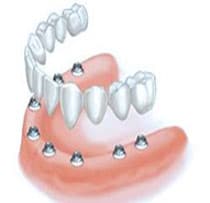
2 Implants + 2 Ball + an over removable overdenture if you lost all teeth on 1 arch
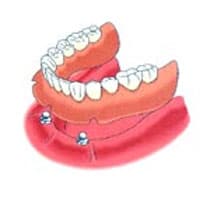
2 Implants + 2 locators + a Removable Overdenture If you lost all teeth on 1 arch
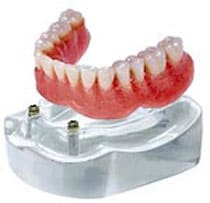
4 Implants + 4 locator + a Removable Overdenture If you lost all teeth on 1 arch
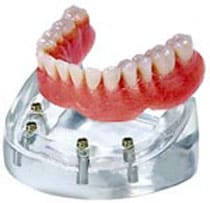
Services
Working Time
- Monday - Friday: 08:00 - 19:00
- Saturday: 08:00 - 18:00
- Sunday closed
Contact Info
- Hotline 1: (+84) 908 321 455
- Hotline 2: (+84) 931 857 885
- Mobile: (+84) 8 3925 8778
- Phone: (+84)2 838 258 778
- info@dentalrose.net
- rosedentalclinicvn@gmail.com
 English
English  Tiếng Việt
Tiếng Việt

